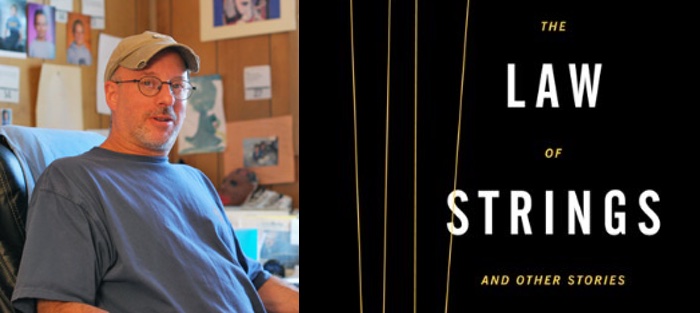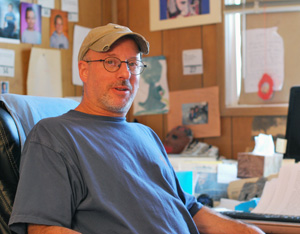Editor’s Note: For the first several months of 2022, we’ll be celebrating some of our favorite work from the last fourteen years in a series of “From the Archives” posts.
In today’s feature, Tyler McMahon talks with Steven Gillis about his collection The Law of Strings and his varied career as short story writer, novelist, editor, and publisher. This interview was originally published on September 3, 2012.
Steven Gillis is a literary Renaissance man. In addition to the half dozen books of fiction under his belt, he is the founder of 826michigan and the publisher of Dzanc Books—one of the great contemporary forces in independent publishing. His latest work—The Law of Strings, a collection of stories from Atticus Books—is strange, surprising, and ever original. It features magicians, tightrope walkers, and levitators, living fantastic lives but suffering ordinary problems. Gillis spoke with us about writing, publishing, and the next Renaissance.
Interview:
Tyler McMahon: One of the most striking aspects of The Law of Strings is the level of verisimilitude, or lack thereof. I noticed the word “surrealist” used to describe the stories, but that doesn’t seem to quite encapsulate the whimsical, highly-unlikely-but-not-necessarily-impossible nature of the book. Do you think that comparisons to George Saunders or Aimee Bender are accurate? Were any other writers on your mind when you conceived of the collection’s tone and its relationship to realism?
 Steven Gillis: First, any comparison to Saunders and Bender is an honor. It is true, I have read both extensively and often and they are brilliant and their works are seminal to be sure. It is impossible to read anything that remarkable and not be influenced to some degree. I would not say however I set out to emulate them. There is a slippery slope when an author tries to mimic rather than simply write in their own way. I read so much that the good stuff filters into my creative process at some level, mixing together in an alchemydo of Gillis soup.
Steven Gillis: First, any comparison to Saunders and Bender is an honor. It is true, I have read both extensively and often and they are brilliant and their works are seminal to be sure. It is impossible to read anything that remarkable and not be influenced to some degree. I would not say however I set out to emulate them. There is a slippery slope when an author tries to mimic rather than simply write in their own way. I read so much that the good stuff filters into my creative process at some level, mixing together in an alchemydo of Gillis soup.
As for what I try to achieve with my stories, you’re right–I don’t really like the term “surreal,” as it suggests something false and artificial. I think my writing—and the true masters, like Saunders and Bender and Barthelme and Hannah and many others, including Cheever who is my first love—look for ways to present the truth. I firmly believe nothing requires more truth than fiction. The presentation, setting, and style, is simply a vehicle for getting to that truth. I practiced law many years ago and nothing requires more fiction than lawyer-ing. But I digress.
In searching for ways to explore and express the true human experience, I find, for me, that pushing the envelope out a bit, taking the real world and turning it inside out and sideways, works best. Everything I write, no matter how strange, is grounded in the human experience. So I can set the story in some perverted sense of the real world and yet, at its core, everything I am writing about is still totally focused on what it means to be a human and deal with the shit and pathos that affects us all. For me, putting someone hundreds of feet above a canyon on a wire, or disappearing in a box, or in a cage with dogs, is not so strange. What is interesting is how we as humans—how my characters—deal with their lives and the conditions in which they live. It’s interesting to me to discover that, no matter what the setting, everything we do is rooted in a pretty basic element of our human condition. Either that, or I am just crazy mad and like to mess with reality for sport.
Speaking of wires above canyons, my personal favorite story from the collection is “Falling,” in which a professional tightrope walker/general adventurer can’t express himself to his lover, even in the simplest way. Throughout the book, there are several incarnations of similar contrasts: characters with remarkable outer lives that suffer from some sort of inner vulnerability or dysfunction. Is this something you consciously set out to explore? Does the collection contain an overarching statement about inner versus outer lives?
Great question. In truth, I didn’t set out to write a collection with one connecting theme. I wrote a bunch of stories, and then there they were, with my guts and piss and blood all over them. Everything exposed, and here I thought I was writing fifteen totally different stories. But when you read them, you are right, there is a related theme. Still, I didn’t consistently or consciously set out with any premeditation to do this. Of course, everything a writer creates is at some level a conscious decision. The theme of inner versus outer lives is definitely a theme close to me, and I don’t ever really escape it, do I? I write about characters I can relate to, and the idea of alienation and the inability to fully grasp or convey emotions, or deal with emotions, is a central condition to my writing. And my personal life as well, which from that confession I suppose you can glean is messy.
I explore the idea of contrasts and dysfunction, of the conscious versus the subconscious, the surface versus the internal a great deal–it’s true. And love. Always love, as that is the gerbil wheel in which we all turn, turn, turn. While putting my characters in different situations, the settings serve as the vehicle by which to strip characters bare and force them to see or deal with or suffer the consequences of their own circumstance. I firmly believe we are all scared children at heart. That everything from timidity to arrogance, bravado to cowardice are all rooted in our inner confusion. This is what I tap into. The how we came to be as we are, and in what way we deal—or don’t deal—with the world around us.
Your career is remarkable in the sense that you’ve split yourself fairly evenly between novels and short fiction. And, in the case of this collection, there’s a definite sense of thematic and stylistic unity tying all the pieces together. Do you feel more comfortable working in one form or another? Do you work on stories and novels simultaneously? What’s different about writing in one form versus another?
I don’t ever work on two things at once, though I will come up for air from a novel and do a few stories, if that makes sense. But I won’t go back and forth, and I always finish a story I start. I tend to be in a novel for six months on average, then write stories to clear my head and tighten my style. (A novel tends to take me close to three years in writing time, which may happen over a four-year period.) Stories require a different muscle than the novel, and both genres help the other. It’s truly like athletics for me; one needs to do conditioning exercises like lifting and running to excel at the main sport. Short stories help me as a novelist, and writing a novel makes me a more enthused and focused short story writer. I find in moving from one to the other it’s all about following my gut. I get in novel mode, and I can be in that mindset, as said, for several months at a time.
My current novel in progress is the longest I have ever stayed with one project—nearly three years straight. I have recently come up for air and am working on stories. My gut told me I couldn’t go one more day on the novel without losing all perspective. When I am in short story mode, I think stories are the greatest and most exciting form in the world. And when I am in novel mode, I think nothing is more important than the novel. I love them both and am comfortable with either in the sense that I work on one till my gut insists I move to the other. The difference is my wife tends to hate me when I am well into a novel, and with short story writing I get lots more sex.
The novel obviously requires a longer attention span, like long-distance running, and one’s focus and attention to detail is different, the notion of pace over a much longer story. And yet I do try and think of my novels as one long story. With short stories, it’s more a sprint—in style not in creation as I still focus exactly the same, and the process is just as difficult to create something worthwhile. A great short story amazes me no less than a great novel. Still, with a story, I know I will be done in a few weeks, and my objective is very tight and contained. With a novel, there are many more characters and themes within themes. Ah, I could write a book on this.
Could you speak to your experience of being a working writer as well as a founder, publisher, and editor at Dzanc Books? It seems more common to wear both hats in poetry and other fields. And my mind immediately goes to the 1980s hardcore punk underground, in which being a musician was synonymous with starting a small label and promoting like-minded acts, etc. I’ve always felt that our discipline—fiction—is curious in its stubborn separation of artists and editors. How do your editing duties affect your writing? Do you think our craft would be better off with more warrior philosophers like yourself? Do have a different aesthetic as an editor than you do as a writer?
We’re all punks, aren’t we? We’re all freakin’ rogue warriors. Let me answers your questions backwards, if I can, then give you an overview about myself and Dzanc, which I very much appreciate your asking.
First, no, I am very conscious of applying the same aesthetic as a writer as I do as an editor. They are both very deliberate and intense disciplines. The only difference is, as a writer the work is mine while as an editor, my job is to make the particular author’s work as great as it can be via their vision. I am never, ever, supposed to nor do I attempt to turn a writer’s work into a Gillis narrative. My job as editor is to understand and work with another author’s aesthetic. I will admit, at first, I thought I’d have a hard time doing both my own writing and editing, but I was surprised to find this isn’t the case. In fact editing another writer’s work is a liberating exercise, in terms of when I go back the next day to my own work.
As much as I put into editing, the process gives back to me even more, and I learn from it. It’s like a doctor dissecting a corpse—hell, that sounds terrible—I mean: viewing another surgeon operate. I can study and become intimate with another writer’s process, and this can only enhance my own writing. I have heard other writers say they can’t read when they are writing. I find this absurd. Editing and reading only make my own writing better. And yes, I think there are many great editors out there who don’t call themselves writers, but editing is its own form of writing, and I am sure if more writers took up the task, our craft would indeed be better for it.
My own editing role at Dzanc has shifted back a bit now that my overarching role as publisher takes up so much of my time. But we have on staff one of the truly great writers and editors: Matt Bell. Matt is not only a remarkable writer, but his eye as an editor is exemplary, and Dzanc would not be Dzanc without him.
As for my role then at Dzanc as editor/publisher, and my identity as a writer, I not only don’t see a problem, I think it’s a huge advantage. Think about it. Who would you rather have review your submission: another writer who understands the craft and is interested solely in acquiring the greatest writing, or some pencil-pushing New York “publisher” who knows nothing about the intimacies of writing and whose sole focus is on the market and what book will sell?
I generalize, of course. I shouldn’t insult pencil-pushers. New York publishing has become a joke, an oxymoron. The only real publishing takes places in the indie publishing arena. I swear, and you ask any literary fiction reader and writer, the books you see reviewed and nominated for end-of-the-year awards from the big houses pale beside the works that the indie publishers are bringing to market. It’s not even close. The world has fallen off its axis. It used to be great writing was revered and actually read and discussed. Now shit sells, and the majority of the audience doesn’t even know the difference.
The big houses push their crap to make money. That’s their only interest. And the irony is, they are so bad at choosing the books they market, you might as well have a sixth-grader making the decisions. Again, no insult meant to sixth-graders. I will compare Dzanc’s list of books to any house in the world. Our concern is solely about the writing. And the author. That is all. We don’t care about paying for fancy lunches and dinners and houses in the Hamptons. We aren’t in bed with agents. We are literary fiction publishers. That is why Dan Wickett (the best literary mind and greatest partner I could have) and I founded Dzanc books seven years ago. Because we knew for a fact there were great writers out there whose work deserved and needed to be published. That is the bottom line. That is all there is. Okay, that’s my soapbox pitch. Getting down now. But damn, do I think writers should be involved in publishing? Doesn’t the question answer itself?
I probably speak for a lot of writers when I say that, seeing houses like Dzanc do so well and get so much great work into the hands of readers who appreciate it is a massive source of optimism and encouragement. How does the future of publishing look from your vantage point?
From my vantage point? You mean as the publisher of Dzanc looking down on everyone else? Sorry, couldn’t resist. Honestly, I’d like to say that publishing—and I am speaking of literary fiction publishing—should remain strong, as long as there are amazing writers producing substantial works. That’s the easy answer.
As for the more difficult reply you are looking for: publishing today is at a crossroads. With Amazon looking to move into publishing, with agents blurring the line and becoming publishers and muddying the eBook market, these are odd times to be sure. We have large publishing houses continuing to be totally about the bottom line and less and less about publishing great books. Think about it—there are major houses in New York that have laid off all their editors. Let me repeat that: publishing houses who do not employ editors to work with writers.
So much of what publishing has become at the big houses is about money and business that lost in the process is the truth. The truth that we are supposed to be putting the product first, and the product is literature, is books. And books are the freakin’ backbone of what allows us as a country to sustain our intellect, our creativity, our exchange of ideas. Treating publishing solely as a business warps the mission of what publishing is supposed to be.
Look at the history of great publishers. Barney Rossett, Roger Straus, John Farrar, The Fiction Collective with Jonathan Baumbach—now published by Dzanc. Did a single one create their houses because they wanted to make a fortune? No, every single one got into the game because of their love of writing. So what happened? What the hell happened?
That said, independent publishing is very strong. We have great people, editors and publishers, who care passionately about bringing amazing writers to the public. EBooks—as Dzanc champions along with our print list—will continue to increase their market share. The upside is that more fantastic works become accessible to the reading public. (The downside is self-publishing, but I digress.)
To me, publishing is all about keeping one’s eye on the prize. Each day, we at Dzanc are looking for great new works to bring out in print and eBook form, and older works to bring out in our rEprint series. Reading is the best means for sharing creative ideas with a broad audience. Publishing is the vehicle by which these books are brought to the marketplace. As long as publishers remember this, everything will be cool.
Further Links and Resources:
- “The Story of Dzanc Books,” by our own Jeremiah Chamberlin, in Poets & Writers.
- A novel excerpt from The Consequence of Skating, published in Guernica.







